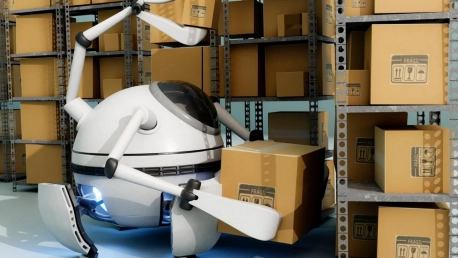The retail landscape is undergoing a seismic shift as innovations in automated inventory management begin to reshape the industry. Retailers are increasingly turning to robotics and advanced systems to streamline inventory tracking, enhance accuracy, and improve overall efficiency. This article delves into the transformative effect of these technologies on retail operations and the future of the sector.
The Rise of Robotic Process Automation in Retail
Transforming Inventory Tracking with Robotics
The integration of robots into inventory management is radically altering how retailers manage stock. By implementing robotic process automation (RPA), businesses can expect enhanced precision in stock levels and a significant decline in manual errors. Warehouses now frequently employ robots for tasks that were traditionally labor-intensive, such as sorting, packing, and shelving products, which speeds up the overall process and improves inventory tracking.
The Ripple Effect on Business Operations
The influence of automation transcends inventory control. This innovation is transforming every aspect of the retail business—from refining supply chain logistics to elevating customer service. Even the design of brick-and-mortar stores is adapting with automated solutions. Retailers seek to create a shopping environment that aligns with the speed and efficiency that customers have come to expect in the digital era.
Patent Proliferation Pushes Retail Boundaries
Innovation Through Extensive Patenting
A significant uptick in patent filings reflects the enthusiasm with which the retail sector is embracing automation. Companies of all sizes, from industry behemoths to agile startups, are keen to protect their innovations. These patents are critical, providing a foundation for a myriad of emerging technologies tailored to revolutionize inventory management. The breadth of this intellectual property suggests that we are only at the cusp of what automated systems will be able to accomplish in the retail space.
Geographic Dominance in Retail Automation
Patent filings are a testament to the global outlook of retail automation. Firms like Exotec Solutions and Coupang are expanding their technological footprint, filing patents that transcend national boundaries. The diverse geographical reach of these technologies underlines the industry’s move towards a more harmonized, international approach to retail automation.
Restocking the Future: Advanced Tech in Inventory Management
Role of Real-Time Data in Inventory Efficiency
Real-time data has become a cornerstone of inventory management. This level of instant information empowers retailers with the ability to rapidly adjust to market fluctuations and manage inventory more effectively. Having access to up-to-date information is becoming increasingly crucial in a retail industry where the speed of response can be the difference between profit and loss.
Remote Management and Automation Synergy
One of the standout benefits of advanced automation is the capability to manage retail systems remotely. Retailers now have the freedom to continuously optimize their operations without being physically present. This remote management capacity is especially pivotal during times when on-site supervision is constrained, ensuring uninterrupted optimization of inventory management.
The Competitive Advantage of Automation in Retail
Streamlining Costs and Enhancing Decision-Making
The financial aspect of automated inventory management cannot be overstated. By reducing the need for manual labor and improving strategy with data analytics, retailers are able to slash costs considerably. The data collected by automated systems provides invaluable insight into consumer behavior and inventory trends, allowing for smarter, more informed business decisions.
The Future of Retail Lies in Automation
The retail world is in the midst of a major transformation as automated inventory management systems revolutionize the way businesses track and manage their stock. Embracing the power of robotics and sophisticated technologies, retailers are now able to significantly enhance their inventory accuracy and streamline their operations for greater efficiency. These advanced systems are not only changing the dynamics of stock management but are also setting the stage for the future of retail. As this trend continues to evolve, it’s clear that the adoption of automation in inventory processes is a game changer, promising to reshape the retail industry by minimizing errors, reducing labor costs, and providing real-time data for better decision-making.









